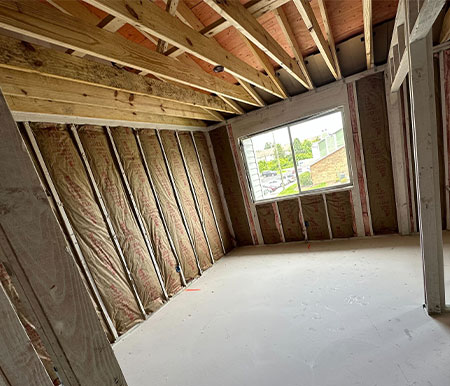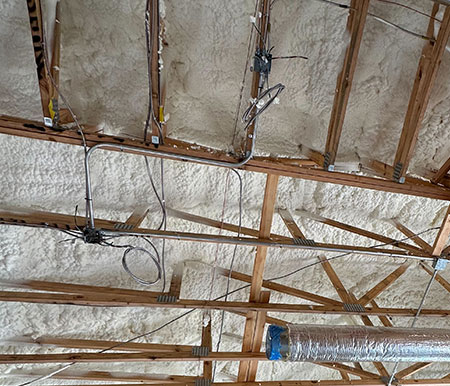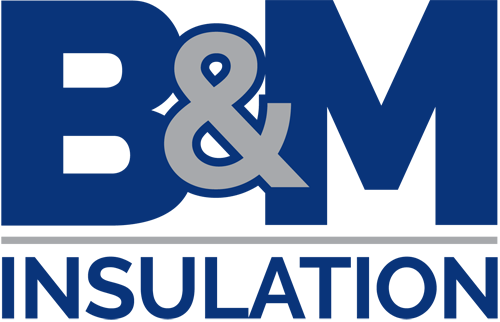If you’ve ever lost sleep to noisy neighbors, barking dogs, or 2AM construction, you already know what noise pollution is, even if you’ve never called it by name. These “unwanted or disturbing sounds” can disrupt your quality of life. Whether it’s traffic on I-24 or late-night concerts in downtown Nashville, unwanted noise has real effects on your well-being.
Research has shown that chronic exposure to noise can increase stress, disrupt sleep, raise blood pressure, and even affect your productivity. It’s estimated that tens of millions of people worldwide are exposed to harmful noise daily. In Europe, noise ranks as the second biggest environmental health risk after air pollution.
Residents right here in Tennessee have been feeling it too. Our vibrant cities full of live music, busy roads, and new construction create endless noise pollution. Just ask the residents “sleepless in the Gulch” in downtown Nashville. In August of 2024, overnight construction sparked many complaints from residents.
Here’s the good news: a quieter home is within reach with the sound lessening power of insulation.
The Role of Insulation in Noise Reduction
Insulation isn’t just for staying warm in the winter or cool in the summer. It also serves as one of the most effective soundproofing tools you can use. It acts like a sponge to absorb sound waves and reduce echoing inside your home. Installing proper insulation and sealing air leaks is a highly effective way to reduce airborne noise from traffic and outside sources.
How does insulation work to block noise? It’s all about mass and absorption. Adding insulating materials to your exterior walls and ceilings makes it harder for sound to travel. Thicker insulation layers absorb more sound, especially higher-frequency noise.
Insulating your interior wall spaces and between floors is also a smart move. It helps stop sound like footsteps, flushing toilets, and loud conversations from bouncing around your house. Some building codes even require common walls between apartment or condo units to be insulated for sound control.

Types of Insulation for Noise Reduction
Let’s look at some of the most common insulation types used as soundproofing materials and how they stack up for reducing noise:
Fiberglass Insulation
Fluffy fiberglass is the most recognizable and affordable insulation type on the market. Lightweight fiberglass rolls or pre-cut batts offer effective sound dampening. It’s often used to fill wall cavities and attics to muffle sound.
Cellulose Insulation
Made from recycled paper, this loose-fill or dense-pack material is heavier than fiberglass and packs tighter. It reduces noise transmission as well or better than fiberglass insulation. Its high density helps it block both sound and airflow. Cellulose insulation is commonly used in walls and attics for its energy-saving and eco-friendly benefits.
Spray Foam Insulation
Spray foam insulation expands into cracks and crevices, sealing air leaks and blocking sound paths. Open-cell spray foam offers some sound dampening, while closed-cell spray foam acts more as a rigid sound barrier. It’s best when used alongside other fibrous soundproofing materials for optimal performance.
Choosing the Right Insulation for Your Home
Start by identifying your biggest noise problems. Is it loud traffic? Thin walls between rooms? Noisy upstairs neighbors?
- For outdoor noise like traffic, focus on your exterior walls, attic, and windows.
- For internal noise between rooms and floors, insulate your interior wall cavities and floors.
- In Tennessee, where we face both hot summers and chilly winters, choose insulating materials that tackle temperature and reduce sound transmission.
If you’re on a budget, target specific areas instead of your whole house. Consider spaces where peace and quiet matter the most, like your bedroom or home office.
When you’re looking to add insulation, be sure to check state building codes and insulation requirements for energy efficiency. There are no restrictions on exceeding insulation minimums for extra comfort and soundproofing. It’s important to factor in moisture considerations and fire safety requirements too.
While some insulation types, like fiberglass and cellulose can be DIY-friendly, it’s always wisest to trust the job to a professional for maximum effectiveness and safety.
Installation Techniques for Maximum Noise Reduction
To truly reap the benefits of soundproofing materials, proper installation is key. Remember, the best time to insulate walls is during construction or renovations, when the wall cavities are open.
- Completely fill cavitieswithout gaps. Try to avoid over-compressing batts.
- Seal the perimeter and penetrations. Use acoustic caulk or weatherstripping around your outlets, windows, and baseboards.
- Resilient channelsor double-stud walls can prevent vibration from traveling. Add a second layer of drywall with a damping compound to boost sound resistance.
- Address the noise between your floors and ceilings by insulating between your floor joists with blown-in cellulose or fiberglass batts. Add carpeting with thick padding or use cork/rubber underlayment beneath hard floors.
- Upgrade to double-pane or storm windows and solid-core doors to keep out noise through your windows and doors.

Benefits Beyond Silence: Energy Efficiency and Comfort
When you insulate for sound dampening, you also gain:
Lower energy bills
Properly insulating and air sealing your home not only gives you a quieter home, but a more energy-efficient one too. The reduced load on your HVAC system helps you save an average of 15% on your annual heating and cooling costs.
Consistent indoor comfort
Say goodbye to drafts and cold spots. Well insulated and sealed walls, floors, and ceilings help maintain more even indoor temps. You’ll enjoy a cozier feel throughout your home.
Reduced stress and better sleep
A quieter environment reduces everyday stress from constant noise. You’ll enjoy improved sleep and better overall well-being. Peace and quiet are good for your health, mood, and productivity.
Year-round TN benefits
Here in Tennessee, the seasonal perks are big. Insulation helps keep your cool air in during our scorching summers, while blocking the noise of cicadas and lawn equipment. In winter, it helps retain heat while muffling the wind and sounds of the snowplow. It also softens the noise of rain on your roof.
Maintaining and Upgrading Your Soundproofing
Insulation isn’t a “set it and forget it” job. It’s important to:
- Inspect your insulation regularly, especially if you live in an older home. Note that loose-fill insulation can settle over time.
- Watch for signs of moisture or pests, which can ruin your insulation’s effectiveness.
- Fix any roof leaks and plumbing issues that could dampen your insulation.
- Upgrade your insulation as needed. About 90% of U.S. homes are under-insulated.
- Focus on insulating your attic first for the quickest return.
Renovating? Add soundproofing materials during construction for long-term results.
When to Call in the Pros
Tackling a project on your own can sometimes be ok, but it’s always best to count on a professional. Professionals can assess your specific noise issues and pinpoint the most impactful solutions. They also are experts on local building codes and types and can avoid common pitfalls.
Licensed installers bring:
- High-powered, specialized equipment.
- Experience with tricky materials and hard-to-reach areas.
- Clean, safe, and code-compliant installations.
Most importantly, they save you from expensive trial and error.

Create a Quieter, More Comfortable Home with B&M Insulation
At B&M Insulation, we’ve been creating a quieter and more energy-efficient Middle Tennessee since 1976. Whether you’re a homeowner looking for peace and quiet, or a contractor building high-performance homes, we’ve got the knowledge, experience, and products to get the job done right.
We offer fiberglass insulation, cellulose insulation, and spray foam insulation, along with expert advice to help you choose the best solution for your home’s needs.
Contact us today to schedule your free estimate and start reducing noise while boosting comfort and efficiency. Your ears, and your energy bill, will thank you.
References
Biddle, Jennifer. “How Noise Pollution Quietly Affects Your Health.” UC Davis Center for Occupational and Environmental Health, 2 June 2025. Web. https://coeh.ucdavis.edu/research/how-noise-pollution-quietly-affects-your-health.
“Insulation: A Consumer Fact Sheet.” Massachusetts Department of Energy Resources, n.d. Web. https://www.mass.gov/doc/insulation-a-consumer-fact-sheet/download.
“Loose-Fill Insulation.” U.S. Department of Energy, Building America Solution Center (Pacific Northwest National Laboratory), n.d. Web. https://basc.pnnl.gov/redcalc/tool/loose-fill-insulation.
“Noise Control Using Insulation: How to Select the Correct Materials to Get the Best Noise Reduction.” Insulation Outlook, 21 June 2023. Web. https://insulation.org/io/articles/noise-control-using-insulation-how-to-select-the-correct-materials-to-get-the-best-noise-reduction/.
New York City Department of Environmental Protection. “Residential Noise Control Guidance Sheet.” 29 June 2016. Web. https://www.nyc.gov/assets/dep/downloads/pdf/air/noise/residential-noise-control-guidance-sheet.pdf.
U.S. Environmental Protection Agency. “Clean Air Act Title IV – Noise Pollution.” EPA, 18 Apr. 2025. Web. https://www.epa.gov/clean-air-act-overview/clean-air-act-title-iv-noise-pollution.
Walker, Kylie. “Deeper Dive into City Ordinances Amid Endless Complaints on Gulch Construction Noise.” Fox 17 News (WZTV Nashville), 14 Aug. 2024. Web. https://fox17.com/news/local/2024-nashville-tennessee-deeper-dive-into-city-ordinances-amid-endless-complaints-on-gulch-construction-noise.
“Why Seal and Insulate?” Energy Star, U.S. Environmental Protection Agency, n.d. Web. https://www.energystar.gov/saveathome/seal_insulate/why-seal-and-insulate.
